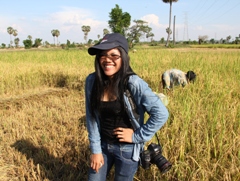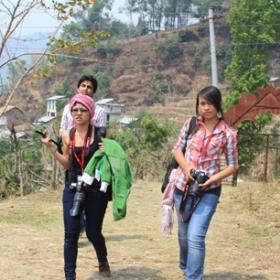



I have been a feminist since before I even realized or understood what feminism meant—before I even heard what “feminism” was about. I am a proud feminist because I advocate for women’s rights. And I will always be a feminist because I have wanted and will always want men and women to be treated equally.
I am the oldest daughter in a family of businessmen. I have a younger sister and a younger brother. My parents have a small family business making and selling jewellery and managing real estate.
For some, I may be considered to be ‘breaking the rules’ and crossing the line because of who I am and what I am passionate in doing. For this, there are people who look at me as a ‘bad girl’ in terms of not following our tradition, the Cambodian code of conduct for women as exemplified in the Chbab Srey.
The Chbab Srey was written by a well-known male scholar named Krom Ngoy and instructs Cambodian/Khmer girls to behave sweetly, and to be gentle, nice, friendly, and weak. A Cambodian woman must respect and serve her husband well, no matter how bad he talks or behaves to her. I am not saying this traditional educational policy is completely biased, but it is a way that men dominate women. The rule was created and added to the academic education system for women to memorize and follow without criticizing any phrases in it.
Traditionally, Cambodian women cannot, by themselves, discuss, debate, or defend their own perspective or point of view. We are strictly “controlled” by men. Men tend to have an advantage over women in many unfair ways because of how society is constructed.
In 2007, the Ministry of Women’s Affairs requested the government remove Chbab Srey from the school program. However, they could not remove the code completely from the curriculum and a shorter version of it is still being taught for the purpose of teaching Khmer literature.
Cambodian girls are compared to prohok (a Cambodian rotten fresh-water fish) or to ‘white fabric’, which can be easily stained. Cambodian boys, however, are compared to ‘gold’. Girls have no right to express their opinion in any conversation or discussion in the family. Their words are rejected and considered to be wrong. It also is forbidden for women to have tattoos. If they go out at night, people will automatically think they are prostitutes.
I was abused both physically and sexually when I was a child. When I remember it, it’s like remembering a nightmare. Every time I visualize the past, I have a panic attack and I lock myself in the dark room with music to help me ease my sadness and pain. I cannot figure out clearly what has happened to me exactly or who was the perpetrator because I am not yet ready to reveal everything which is really deep within me. But my childhood was destroyed and I have been living many years with this torture. Frankly, it has taken me years to disclose this suffering through my first writings, though these do not reveal every part of my story. However, I believe it is good to share the tragedy that happened to me and hopefully some women can be helped from what I endured.
One time when I was about sixteen, I was beaten by my mother after watching a movie in the cinema. Even though I only went there with my girlfriends, she thought that the cinema is a place where young people made dates with their lovers. Since the cinema is a dark place, she said it makes guys excited and they might touch or harass me. She was worried about me and wanted to protect me, but for me, her actions were unjust. Punishing me was not fair at all. Guys should be penalized when they do not respect women! Why should us girls suffer? Why should I need to be responsible for their disrespect? We are the victims, not the perpetrators!
I grew up in a very traditional family with strict traditions that were taught to us by my parents and my grandmother. Because I grew up in a Cambodian culture, I cannot do the things that I desired. I had to fight with them to get what I want, as I described above. I was told to be a ‘proper’ Khmer woman – silent and weak. But maybe I am different from other Cambodian girls. I could not force myself to follow what I do not like – especially unreasonable traditions that perpetuate inequality among men and women. I went against my family many times in what I think were unfair traditions that prevent me from reaching my goals.
In our community, my parents were often blamed for how I look or dress, which do not present a “gentle” Cambodian girl. Wearing shorts or shirts that reveal cleavage or shoulders is considered improper and provocative. I cannot have a boyfriend or communicate closely with any guy because it would make the neighbours think of me as a whore – that’s what my parents always warned me.
“Be home early!” I remember once I came home later than 6:30pm as it was the time I  finished an English class. I was beaten and my books were thrown out of my room because my mother thought that I did not respect family rules and I had put myself in danger.
finished an English class. I was beaten and my books were thrown out of my room because my mother thought that I did not respect family rules and I had put myself in danger.
I was also not allowed to study journalism. My parents said it is not a career for women because it requires constant travel where sometimes I may face many risks. But I secretly applied for the scholarship at the Department of Media and Communication of the Royal University of Phnom Penh. I took a written exam and was interviewed. I passed and when I told my parents, I think they were really secretly proud and happy, but unfortunately they did not express this feeling toward me. However, their pride was helpful to me so I kept going to reach my dream.
Strictness aside, my parents have always set a good example for me. Thanks to their hard work, they raised me to be a good person. I now have a job in a field that I love: journalism. And I believe that I can be a role model for young women in my country. Cambodian society traditionally considers my profession a career that is suitable only for men.
I served as a part-time researcher for the International Federation of Journalists (IFJ) in 2015 and according to its survey on Media and Gender in the Asia Pacific; men dominate the field of journalism in Cambodia. Sadly, the workplace does not protect us women journalists because we are women working in the media, which is less supported.
I personally faced harassment in my work as a journalist. Once I travelled to Malaysia for a meeting regarding IFJ research. There were two Cambodian guys, one working as a journalist a well-known Cambodian newspaper and the other a reporter for one of the country’s most popular TV networks. They bothered me with their behaviour and words.
The first night I needed to stay in a hotel in a suburb of Kuala Lumpur with a female roommate from Thailand, as the organizer had told me. Those Cambodian guys asked me if I was scared and if I was, I could come to sleep in their room and that they would take care of me (or let one of them take care of me). I did not really say anything besides, ‘No, thank you’.
The second night, we all moved to Malacca. This time, each person had an individual room. One of them sent me an SMS to see if I needed a massage when I was in the room alone. I felt so uncomfortable about the proposal and responded ‘No’. A few minutes after, he came to knock my door and called my name. I was surprised and nervous. I did not open the door or answer at all. Then, he was gone.
The day after, I wept and reported the incident to the director the IFJ. She said it was inappropriate and she promised to solve the problem. But until now, my case remains unsolved.
These are only some of the countless unfair events that happened to me, but that encouraged me to be stronger every day.
These experiences led me to commit myself to feminism and women’s rights! When inequality, discrimination, violence, abuse and harassment happened to me, I believe many women are facing the same situation, I have committed myself to advocate for the rights of women because women are also human! I hope, by my writing, it could help the community and improve society and eliminate all forms of discrimination against women.
Now you know why I am a feminist.
Image Credit
Photo 1: Heng Sinith
Photo 2: Vorn Sreyleak